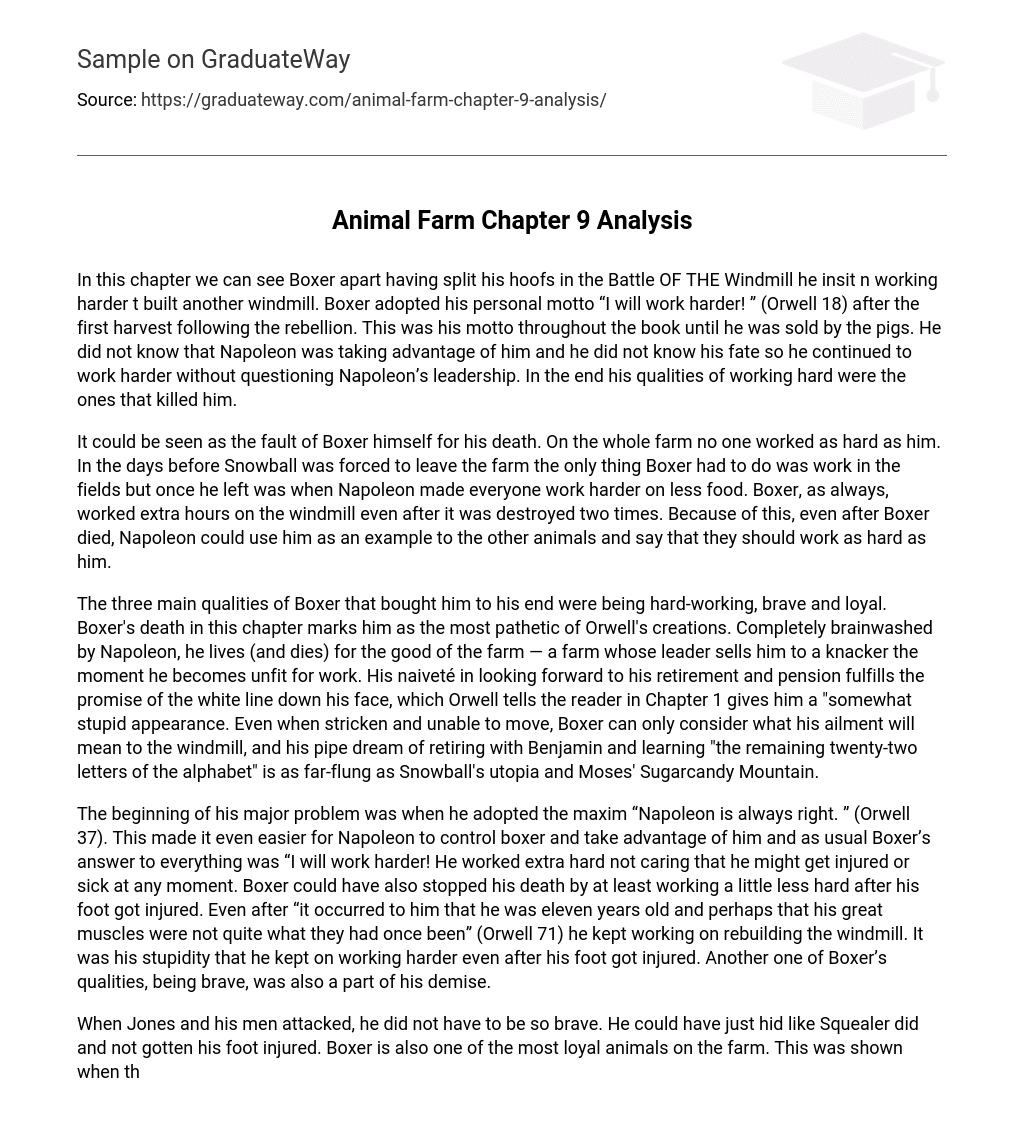In this chapter, Boxer, despite having split his hoofs in the Battle OF THE Windmill, insists on working harder to build another windmill. Boxer adopts his personal motto “I will work harder!” (Orwell 18) after the first harvest following the rebellion. This motto remains with him throughout the book until he is sold by the pigs. Unaware that Napoleon is exploiting him and ignorant of his fate, Boxer continues to work harder without questioning Napoleon’s leadership. Ultimately, it is his unwavering dedication and diligence that lead to his downfall.
Boxer’s death could be attributed to his own actions. Among all the animals on the farm, no one worked as diligently as him. Initially, Boxer’s sole responsibility was fieldwork until Snowball’s expulsion, after which Napoleon enforced stricter labor conditions and reduced food rations. Despite this, Boxer persistently dedicated extra hours to the windmill, even after its destruction on two occasions. Consequently, even in death, Napoleon exploited Boxer as a symbol to persuade other animals to emulate his unwavering work ethic.
The reason Boxer met his end was because he was hard-working, brave, and loyal. Boxer’s death in this chapter is seen as the saddest of all of Orwell’s characters. He is completely brainwashed by Napoleon and lives and dies for the farm’s benefit. However, Napoleon sells him to a knacker as soon as he becomes useless for work. Boxer’s innocence in hoping for retirement and a pension reflects the white line on his face, which Orwell mentioned in Chapter 1 that gives him a “somewhat stupid appearance.” Even when he is injured and unable to move, Boxer only thinks about how his condition will impact the windmill. His dreams of retiring with Benjamin and learning the remaining letters of the alphabet are as unrealistic as Snowball’s utopia and Moses’ Sugarcandy Mountain.
The beginning of Boxer’s major problem arose when he adopted the maxim “Napoleon is always right” (Orwell 37). This made it easier for Napoleon to exploit and control him. Despite the potential risks, Boxer’s response to everything was “I will work harder!” He labored tirelessly, disregarding the possibility of injury or sickness. When Boxer injured his foot, he could have prevented his own demise by working a little less. However, even after realizing that his age had diminished his great muscles (Orwell 71), he persisted in rebuilding the windmill. It was his foolishness that drove him to work harder despite his injured foot. Additionally, Boxer’s bravery also played a part in his downfall.
Jones and his men could have hidden like Squealer did during the attack, avoiding the need for bravery. Despite being injured, Boxer displayed his loyalty by considering whether to crush the dog attacking him or let it go, waiting for Napoleon’s guidance (Orwell 56). Additionally, Boxer’s faithfulness was evident when Squealer falsely accused Snowball of colluding with Jones. Boxer initially doubted the accusation but ultimately trusted Napoleon’s words, concluding “Ah, that is different!”.
If Comrade Napoleon declares something, it is considered correct. ” (Orwell 55) Being devoted to the farm was also a factor in his courageous participation in both the Battle of the Cowshed and the Battle of the Windmill. His loyalty to Animal Farm also had a detrimental impact on his physical health due to the additional labor he undertook in rebuilding the windmill after it was destroyed twice. The scene portraying Boxer’s journey to his demise is significant for illustrating an impotent and innocent character trapped in the relentless machinery of tyranny.
Despite Boxer’s attempts to kick his way out of the van, his once extraordinary strength has been completely diminished by days of exhausting labor for those who torment him. It is only in his final moments that Boxer starts to comprehend the reality of his situation, but it is too late for any change to occur. Additionally, this chapter highlights Squealer’s use of language manipulation for the pigs’ political agenda. The animals willingly accept Squealer’s blatant lies regarding Boxer’s last moments, where he allegedly expressed admiration for both Animal Farm and Napoleon.
Squealer’s most outrageous and blatant propaganda is a source of skepticism for readers who question why the animals don’t suspect anything. The animals are afraid to express any doubt due to fear of Napoleon and his dogs. They are also afraid to investigate further and confront their own consciences. It is politically and morally easier for them to believe Squealer’s lies. By accepting Squealer’s version of events regarding the van’s owner, they can justify their inaction.
Despite having good intentions for the farm from the start, Boxer, unlike some animals, was not clever enough to grasp the true nature of what was happening. Consequently, he persisted in working tirelessly, making his eventual downfall not entirely his fault. Boxer concealed his vulnerabilities and carried on as if everything was well. Even when he sustained an injury, he trusted Napoleon to arrange his hospitalization and remained loyal to him until the bitter end, only to be betrayed and traded for a crate of whiskey. Ultimately, it was these very qualities that led to his downfall at Animal Farm.





